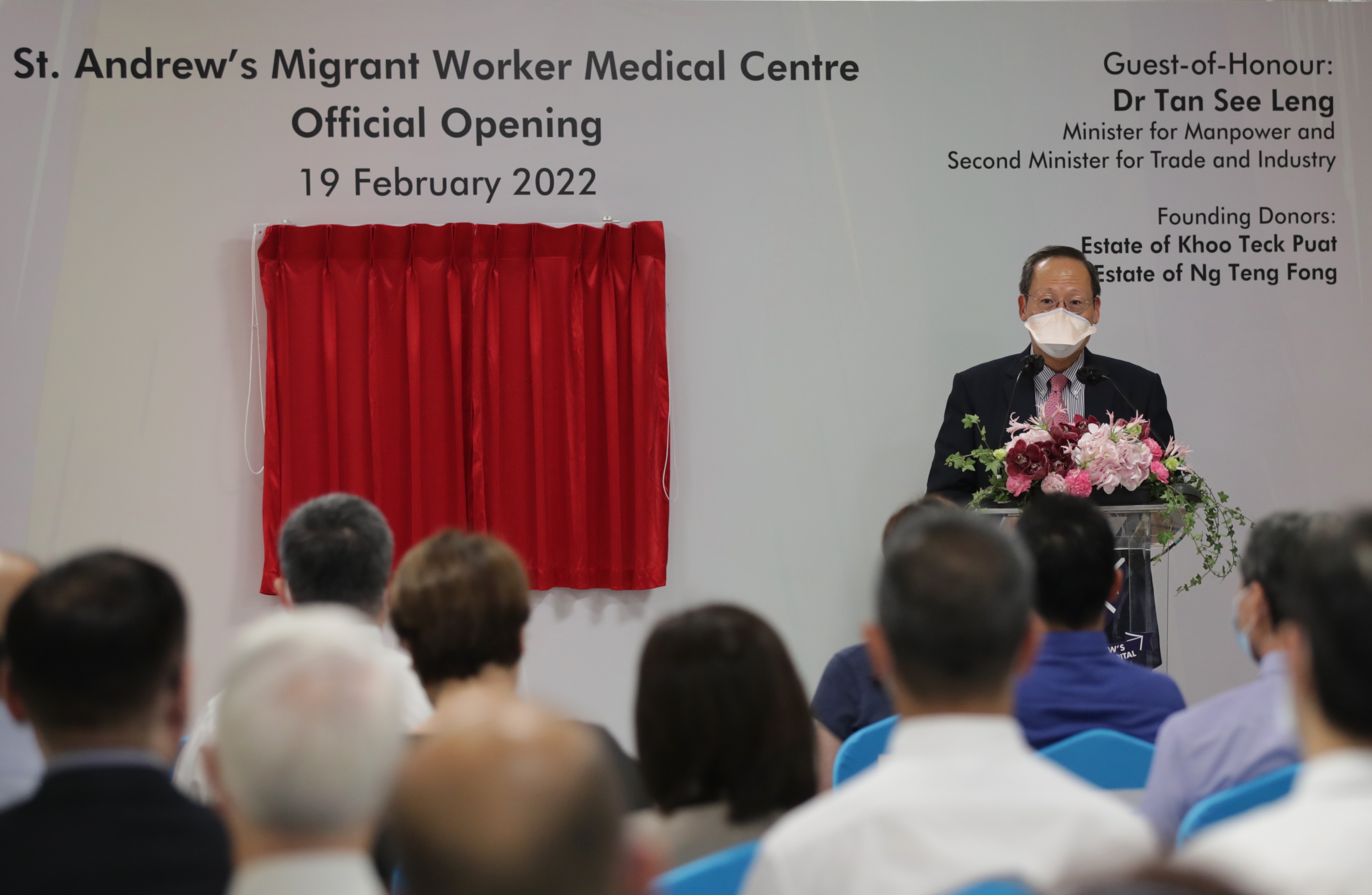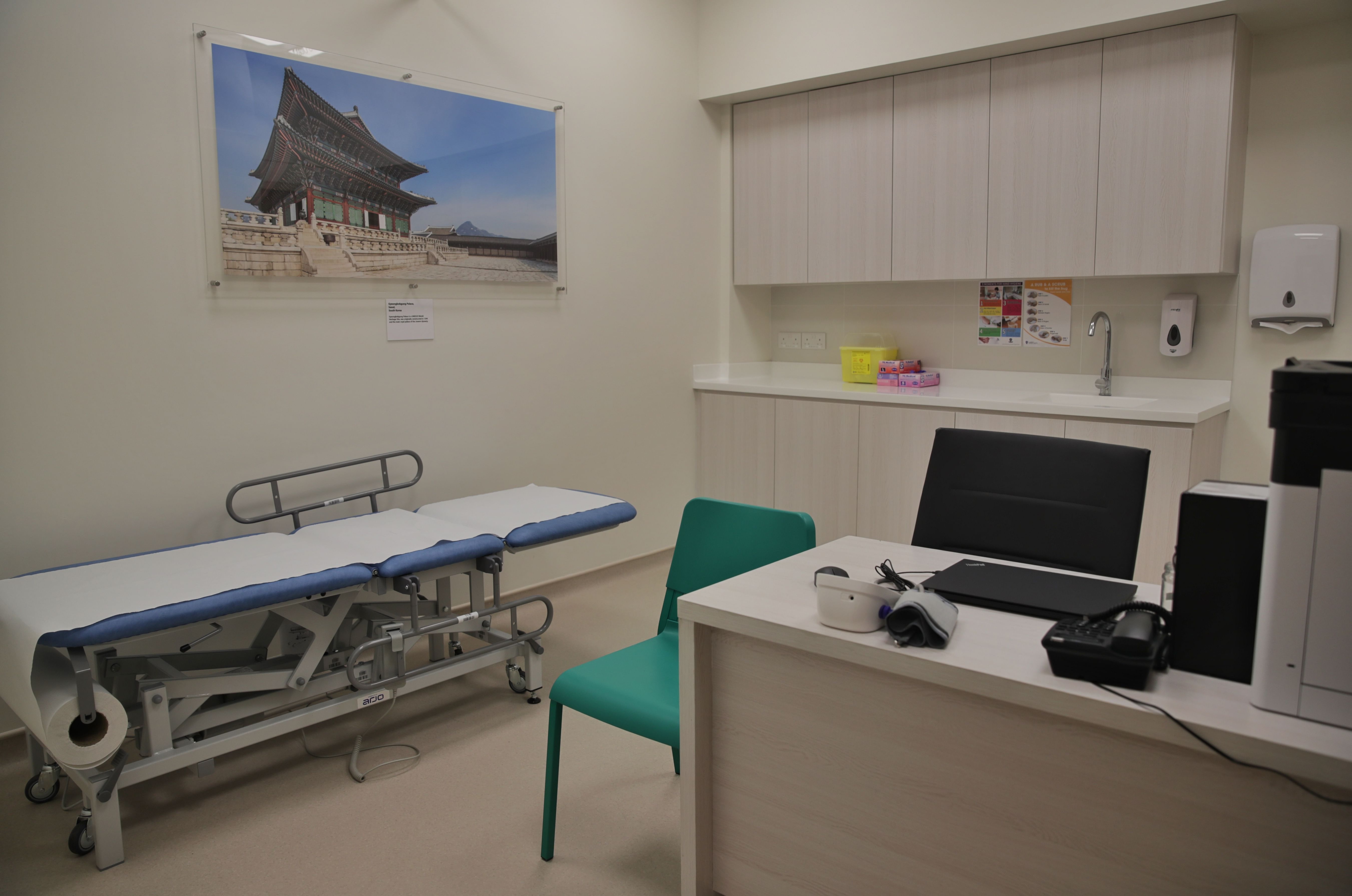Employers must buy primary care plans for migrant workers living in dorms, working in certain sectors from April
Sign up now: Get ST's newsletters delivered to your inbox

Minister for Manpower Tan See Leng delivers his speech during the official opening of St. Andrew's Migrant Worker Medical Centre, on Feb 19, 2022.
ST PHOTO: GIN TAY
Follow topic:
SINGAPORE - From April, employers that hire migrant workers who live in dormitories or work in the construction, marine shipyard and process sectors must buy primary care plans (PCP) to cover their workers' healthcare costs.
This new rule will be part of requirements for such workers to obtain or renew work permits and S Passes, said the Ministry of Manpower (MOM) on Saturday (Feb 19).
The cost of the PCP, first introduced in November last year, ranges from $108 to $138 per worker a year. It can be paid in regular monthly instalments to the healthcare provider in charge of the area the migrant worker lives in.
It will cover most of the migrant worker's primary care needs, including medical examinations for work pass purposes, medical consultations and treatments, annual health screenings and telemedicine.
MOM said the scheme will, for a start, cover roughly a third of migrant workers here, or over 300,000, after the experience of Covid-19 outbreak in dormitories and communal living spaces.
Speaking at the launch of St Andrew's Migrant Worker Medical Centre on Saturday, Minister for Manpower Tan See Leng said the PCP will give migrant workers a greater peace of mind when accessing primary care.
"It will also provide employers with cost clarity and strengthen their protection against unexpected healthcare bills," he said.
St Andrew's Migrant Worker Medical Centre is the first of six regional medical centres here that cater to migrant workers' outpatient care.
Employers of eligible, newly arrived migrant workers need to buy the PCP before their work passes will be issued. The same applies for migrant workers who renew their work passes or change employers.
Existing migrant workers who fall under the scheme must have a valid PCP by March 31, 2023, even if their work passes are due for renewal after that date.
To instil personal ownership of their own health, migrant workers will need to fork out $5 for each visit to the medical centre as co-payment, and $2 for each telemedicine session, said MOM.
For migrant workers not covered under the PCP, the amount co-paid for each outpatient visit can be mutually agreed upon with their employer in their contracts.
This is capped at 1 per cent of their fixed monthly salary, or $5, whichever is higher.


The PCP complements the legal responsibility of employers to buy and maintain medical insurance coverage of at least $15,000 a year for each work permit holder they employ, covering inpatient care and day surgery.
Under a new system, primary healthcare will be delivered in six geographical sectors, each with at least 40,000 migrant workers living both in and out of dormitories.
Announced early last year, it aims to provide affordable healthcare for workers and reduce the risks of future disease outbreaks.
Each sector will be anchored by a regional medical centre, and complemented by on-site medical centres in larger dorms.
Five of the six sectors will be managed by private healthcare providers - StarMed Specialist Centre, Sata CommHealth and Fullerton Healthcare Group.
One was set aside for a non-governmental organisation, St Andrew's Mission Hospital.
Migrant workers will be automatically enrolled with the operator in charge of the sector where they live. There will also be designated general practitioner clinics that will support the new healthcare network.
All six centres will be "pandemic-ready", said MOM, with segregated waiting areas and treatment rooms to mitigate cross-transmission of infectious diseases.


To minimise any cultural and language barriers, the four appointed operators will employ healthcare staff who can speak the native languages of the migrant workers, and have technology-enabled multilingual translation capabilities.
St Andrew's Migrant Worker Medical Centre at Penjuru Recreation Centre is already up and running, serving about 57,000 workers living in areas such as Choa Chu Kang, Jurong West and Pasir Panjang.
The other five centres will be operational by April 1 either at permanent or temporary sites.

